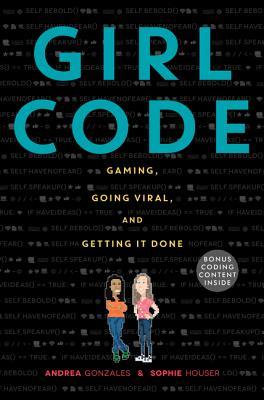Reading Girl Code: Gaming, Going Viral and Getting It Done was accidentally appropriate on my part, as May 11 was National Girls Learning Code Day. This book was written by Sophie Houser and Andrea Gonzales and tells the true story of how they spent a summer learning to code with a Girls Who Code camp in New York City, created a game together as a final project, and experienced their game, Tampon Run, going viral and taking their lives by storm (the game was not working for me when I tried, but there is now a version for iOS included in the link).
There were a lot of things I loved about this book. I love that it was a book written for teens, by teens. I loved that they speak so frankly about their experiences, including both the positive and the negative aspects of their experience. In addition to talking about coding, they discuss topics such as anxiety and impostor syndrome, trying to figure out what you want to do when you "grow up", how to network and deal with social anxiety, balancing work with a social life and grades, and what it's like to be a girl in the tech industry, and also in society (the whole game is trying to break the taboo on speaking about menstruation, after all).
A point made by Sophie in the book is that as she got more and more involved with the buzz and opportunities opened up by the exposure of Tampon Run, she realized just how little grades really mattered or said anything about her as a person. She had created something that had made and was continuing to make a real difference in the real world, and had learned more on how to appreciate learning for learning's sake from this one summer camp than she did at school. That made me incredibly sad to think that students spend so much time working on things that in the end have very little chance to impact the greater world.
Organization Links:
Girls Learning Code Day There are lesson plans and ways to learn, teach and volunteer.
Girls Who Code Canada There are webinars on how to start a free after school club at your school for girls who want to code.
Learn to Code Links:
Codecademy Learn to code for free
Code.org Includes coding lessons and projects for teachers and kids
Scratch Easy software for coding beginners to learn the basics of how code works
Happy Coding!
 |
| Girl Code cover care of Goodreads. |
There were a lot of things I loved about this book. I love that it was a book written for teens, by teens. I loved that they speak so frankly about their experiences, including both the positive and the negative aspects of their experience. In addition to talking about coding, they discuss topics such as anxiety and impostor syndrome, trying to figure out what you want to do when you "grow up", how to network and deal with social anxiety, balancing work with a social life and grades, and what it's like to be a girl in the tech industry, and also in society (the whole game is trying to break the taboo on speaking about menstruation, after all).
 |
| Screenshot from Tampon Run care of the App Store. |
A point made by Sophie in the book is that as she got more and more involved with the buzz and opportunities opened up by the exposure of Tampon Run, she realized just how little grades really mattered or said anything about her as a person. She had created something that had made and was continuing to make a real difference in the real world, and had learned more on how to appreciate learning for learning's sake from this one summer camp than she did at school. That made me incredibly sad to think that students spend so much time working on things that in the end have very little chance to impact the greater world.
Organization Links:
Girls Learning Code Day There are lesson plans and ways to learn, teach and volunteer.
Girls Who Code Canada There are webinars on how to start a free after school club at your school for girls who want to code.
Learn to Code Links:
Codecademy Learn to code for free
Code.org Includes coding lessons and projects for teachers and kids
Scratch Easy software for coding beginners to learn the basics of how code works
Happy Coding!
Comments
Post a Comment